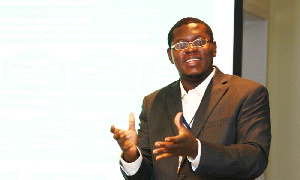Vice President of IMANI-Africa, Bright Simons has criticised Ghana’s new offer to creditors saying aspects of the summary of amendments to the Amended and Restated Memorandum requires clarification.
In a tweet on Friday after the release of the new offer, Bright Simons lashed out at the Finance Ministry insisting the summary contains clauses that are very difficult to understand.
“Such hardball tactics are not endearing” said Bright Simons in a social media post.
A revised prospectus for the domestic debt exchange program has finally been released by government.
Government on Thursday, 2nd February 2023 failed to present its revised and Final Exchange Memorandum as set forth in the Finance Ministry’s January 31st Press Statement.
However, Ghana’s new offer to its creditors was released after working hours on Friday.
Investors are required to review and sign the offer before the 7th February deadline.
Ghana’s Finance Ministry is making earnest moves to push towards the 80% creditor participation rate in the Domestic Debt Exchange Program to guarantee maximum debt relief.
A Debt Sustainability Analysis (DSA) conducted by the IMF demonstrated that Ghana’s public debt is unsustainable, thereby government may not be able to fully service its debt down the road if no action is taken.
Debt servicing is now absorbing more than half of total government revenues and almost 70% of tax revenues, while total public debt stock, including that of State-Owned Enterprises and among others exceeds 100% of GDP.
To address these risks and bring the debt stock to sustainable levels, government is embarking on on a Debt Restructuring Program dubbed a Debt Exchange Program to bring the country’s debt obligations to sustainable levels of 55% to GDP.
Government is in talks with domestic bond holders of approximately GHS137.3 billion of principal amount outstanding to exchange its domestic notes and bonds for a package of new bonds.
The exchange, part of a debt-sustainability plan required by the Washington-based lender is designed to offer relief to the country’s fiscal accounts through an exchange in coupon package on most domestically issued bonds providing a solid foundation for Ghana in the long-term to downsize its debt and reboot the economy.
Meanwhile, Ghana has reached a staff-level agreement with the IMF on economic policies and reforms to be supported by a new three-year arrangement under the Extended Credit Facility (ECF) of about US$3 billion.
Chairman of the Political Affairs Committee of the CPP, Kwame Jantuah
Chairman of the Political Affairs Committee of the CPP, Kwame Jantuah has expressed worry about the government’s lack of information on the Gold for Oil policy.
Reports were rife that the first consignment of oil was purchased with cash from the Bank of Ghana.
However, the Bank of Ghana has denied knowledge of the details of the transaction in government’s gold for Oil barter deal.
The 1st Deputy BoG Governor, Dr. Maxwell Opoku-Afari on Friday, January 03, 2023, told the Public Accounts Committee (PAC) that the central bank is only involved in the purchase of gold and not the exchange.
This was in response to a question posed by the Ningo-Prampram MP, Sam George asking whether he was aware the first consignment of the 40,000 metric tons of oil brought into the country was paid for with cash.
Commenting on the development on Starr FM Weekly Review Program, Mr. Jantuah stated that the government is creating room for questions on the program.
“Where is the money coming from, is Bank of Ghana loaning money to the government to do this? They say it’s a barter but they have sold gold, who did they sell it through or they sold it through a gold trader? How did the traders charge to sell oil to Ghana, so they have gotten money where did that money go? Where have they kept that money or that money has been kept in a Bank of Ghana offshore account.
“How much is the money, out of this money that the gold was sold how much of that money was used to purchase the 40,000 metric ton of oil? We don’t know anything about that. Then buying the petroleum, they bought it from another international oil trader?
“So if they bought it from Russia there is a trader who is fronting for Russia, it could be Lethasco but we don’t know whether Lethasco is a special purpose vehicle that is handling this entire thing. If it is Lethasco then there must be an independent trader. How much did that independent trader charge?”
Meanwhile, the Bank of Ghana has assured the Public Accounts Committee of Parliament that it will provide the requisite documents on the ounces of gold used for the first consignment of the gold for the oil deal.
“What I can confirm is that the gold is being purchased in local currency [in cedis] so it is a conversion of our local assets into foreign assets, and then it is being purchased at the world market price. We use the Bloomberg and Reuters market prices to purchase the gold.”
“I will beg the committee because I do not have the full details now…the details of the transaction would be presented before the committee in due course.”
Source: starrfm.com.gh




